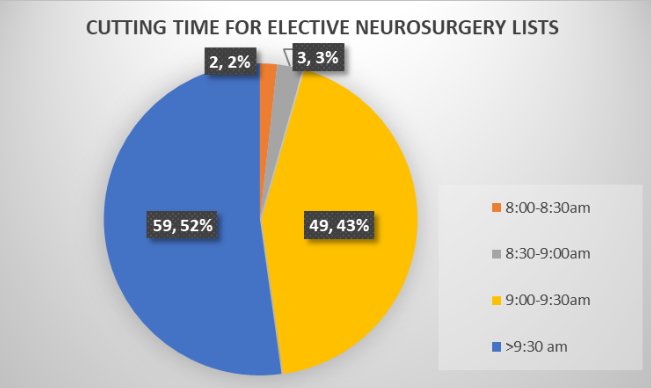Reasons For Cancellation Of Elective Neurosurgical Operations at a Referral Hospital In Malawi
Keywords:
Elective, CancellationAbstract
ABSTRACT
Introduction: Unanticipated cancellation of scheduled elective operations may lead to dissatisfaction among patients, increase costs, and also reflect inefficiency in the management of the operating theatre. Knowing the reasons, appropriate steps can be implemented to reduce the rate of cancellations of elective operations. Materials and methods: This was a prospective observational study conducted at Kamuzu Central Hospital in Malawi. The aim was to determine the rate and causes of cancellation of elective neurosurgical procedures and to suggest changes that can reduce such cancellations. Scheduled elective neurosurgical procedures were reviewed from theatre records from October 2021 to October 2022. Operative cancellations were defined as those patients who were scheduled on the operative list but did not have the planned surgery on the intended date. The collected data were analysed using descriptive statistics. Results: According to this audit, 21% of the 295 elective surgical procedures were cancelled, with the three most frequent reasons for cancellation being insufficient theatre time (40%), uncontrolled medical disease (15%), and the unavailability of an ICU bed for postoperative care (15%). Conclusion: The cancellation rate in this study was high. Appropriate measures need to be taken to improve theatre utilisation and efficiency at Kamuzu Central Hospital.
References
Tait AR, Voepel-Lewis T, Munro HM, Gulstein HB,Reynolds PI (1997). Cancellation of pediatric out-patient surgery: economic and emotional implications for patients and their families. J. Clin. Anesth. 9: 213-219
Miller GG (2004). Waiting for an operation: Parent’s perspectives. Can. J. Surg. 47(3): 167-169 Mypet CD (2002). An audit of the use of ophthalmic theatre time. Community Eye Health. 15:61-63
Kolawole IK, Bolaji BO (2002). Reasons for cancellation of elective surgery in Ilorin. Niger. J. Surg. Res. 4(1-2)):28-33
Schofield WN, Rubin G, Piza M, Lai YY, Sindhusake D, Feamside MR, Klineberg PL (2005). Cancellation of operations on the day of intended surgery at a major Australian referral hospital. Med. J Aust. 182(12):612-615
Pandit JJ, Carey A (2006). Estimating the duration of common elective operations: implications for operating list management. Anaesthesia .61(8):768-776.
Ebirim L.N, Buowari D.Y, Ezike H.A (2012) Causes of cancellation of elective surgical operations at a University Teaching Hospital. J of Med and Med Sci Vol. 3(5) pp. 297-301
Macario A. Are your hospital operating rooms “efficient”? A scoring system
with eight performance indicators. Anesthesiology. 2006; 105:237-40.
The Association of Anaesthetists of Great Britain and Ireland (2003). Theatre efficiency; Safety, quality of care and optimal use of resources.
Vinukondaiah K, Ananthakrishnan N, Ravishankar M (2000). Audit of operation theatre utilization in general surgery. Nat. Med. J. Ind. 13(3):118
Zafar A, Mufti TS, Griffin S, Ahmed S, Ansari JA (2007). Cancelled elective general surgical operations in Ayub Teaching Hospital. J. Ayub. Med. Coll. Abbottabad. 19:64-66
Garg R, Bhalotra AR, Bhadoria P, Gupta N, Anand R (2009). Reasons for cancellation of Cases on the Day of Surgery- A Prospective Study. Ind. J. Anaesth. 53(1):35-39
Bathla S, Mohta A, Gupta A, Kamal G (2010). Cancellations of elective cases in pediatric surgery: An audit. J. Ind. Assoc. Paed. Surg. 15:90-92.
Jonnalagadda R, Walrond ER,Hariharan S, Walrond M, Prasad C (2005). Evaluation of the reasons for cancellations and delays of surgical procedures in a developing country. Int. J. Clin. Pract. 59(6):716-720
Robb WB, O’Sulluvan MJ, Brannigan AE, Bouchier-Hayes DJ (2004). Are elective surgical operations cancelled due to increasing medical admissions? Ir. J. Med. Sci. 173(3):129-132
El-Dawlatly AA, Turkistani A, Aldo hayan A, Zubaidi A, Ahmed A (2008). Reasons for cancellation of elective surgery in a teaching hospital. The Internet Journal of Anesthesiology. Vol.15 Number2 Ebirim et al. 301
Anderson RP, Guyton SW, Paul DL, Tidwell SL (1993). Selection of patients for same-day coronary bypass operations. J. Thorac. Cardiovasc. Surg. 105:444-451
Conway JB, Goldberg J, Chung F (1992). Preadmission anaesthesia consultation clinic. Can. J. Anaesth. .39:1051-1057.
Farasatkish R, Aghadaii N, Azarfarin R, Yazdanian F (2009). Can preoperative anesthesia consultation clinic help to reduce operating room cancellation rate on the day or surgery? Rawal Med. J. 34: 26-28
Troung A, Tessler MJ, Kleiman SJ, Bensimon M (1996). Late operating room starts: experience with an educational trial. Can. J. Anesth. 43:1233-1236
Audit Commission. Anaesthesia Under Examination. The Efficiency and Effectiveness of Anaesthesia and Pain Services in England and Wales. Dec 1997.
Malawi MoH/DHIS 2, 2013-14. Annual Health Sector Performance Report (2014)

Downloads
Published
How to Cite
Issue
Section
License
Copyright (c) 2023 East African Journal of Neurological Sciences

This work is licensed under a Creative Commons Attribution-NonCommercial-NoDerivatives 4.0 International License.

